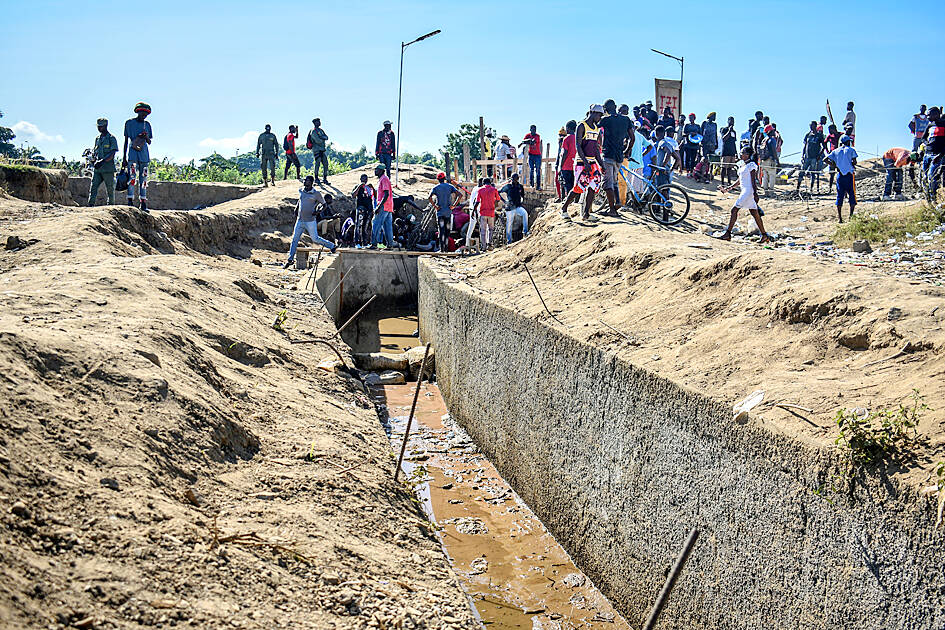Dominican Republic President Luis Abinader on Sunday defended his decision to close air, sea and land traffic with neighboring Haiti in their dispute over construction of a canal targeting a river that runs through both countries.
Abinader said in a televised speech that the border closures that began on Friday are to remain in place until construction is halted on the canal, which seeks to use water from the Massacre River to alleviate a drought in Haiti’s Maribaroux plain.
“We do not desire or seek confrontation, but we are confronting the uncontrollable people who keep Haiti insecure, and who, due to their private interests, now also conspire against the stability of their government and the security of our water resources,” Abinader said during his brief speech, referring to gang violence that has engulfed Haiti.

Photo: EPA-EFE
Accusing Haiti of breaching a 1929 treaty between both countries, he said that the Massacre River is a key resource for Dominican farmers and that construction could damage the environment, including a wetland.
“The precedent of an irrigation project built unilaterally can lead to an escalation of constructions that would destroy the river,” Abinader said.
The river is named after a bloody battle between French and Spanish colonizers, and it was the site of a mass killing of Haitians by the Dominican army in 1937.
The full border shutdowns came four days after Abinader announced that his administration had stopped issuing visas to Haitians and had closed the border near the northern town of Dajabon.
He said it was important to raise awareness in the international community so it comes to Haiti’s aid.
“There is no Dominican solution to Haiti’s problem,” Arbinader said. “We cannot be asked for more than what we already do.”
A spokesperson for the office of Haiti’s prime minister declined to comment on Sunday and referred to a Friday statement condemning Abinader’s decision to shutter all borders while both sides were meeting to find a solution.
Haiti’s government has said it supports the canal project.

A French-Algerian man went on trial in France on Monday for burning to death his wife in 2021, a case that shocked the public and sparked heavy criticism of police for failing to take adequate measures to protect her. Mounir Boutaa, now 48, stalked his Algerian-born wife Chahinez Daoud following their separation, and even bought a van he parked outside her house near Bordeaux in southwestern France, which he used to watch her without being detected. On May 4, 2021, he attacked her in the street, shot her in both legs, poured gasoline on her and set her on fire. A neighbor hearing

DEATH CONSTANTLY LOOMING: Decades of detention took a major toll on Iwao Hakamada’s mental health, his lawyers describing him as ‘living in a world of fantasy’ A Japanese man wrongly convicted of murder who was the world’s longest-serving death row inmate has been awarded US$1.44 million in compensation, an official said yesterday. The payout represents ¥12,500 (US$83) for each day of the more than four decades that Iwao Hakamada spent in detention, most of it on death row when each day could have been his last. It is a record for compensation of this kind, Japanese media said. The former boxer, now 89, was exonerated last year of a 1966 quadruple murder after a tireless campaign by his sister and others. The case sparked scrutiny of the justice system in

DITCH TACTICS: Kenyan officers were on their way to rescue Haitian police stuck in a ditch suspected to have been deliberately dug by Haitian gang members A Kenyan policeman deployed in Haiti has gone missing after violent gangs attacked a group of officers on a rescue mission, a UN-backed multinational security mission said in a statement yesterday. The Kenyan officers on Tuesday were on their way to rescue Haitian police stuck in a ditch “suspected to have been deliberately dug by gangs,” the statement said, adding that “specialized teams have been deployed” to search for the missing officer. Local media outlets in Haiti reported that the officer had been killed and videos of a lifeless man clothed in Kenyan uniform were shared on social media. Gang violence has left

US Vice President J.D. Vance on Friday accused Denmark of not having done enough to protect Greenland, when he visited the strategically placed and resource-rich Danish territory coveted by US President Donald Trump. Vance made his comment during a trip to the Pituffik Space Base in northwestern Greenland, a visit viewed by Copenhagen and Nuuk as a provocation. “Our message to Denmark is very simple: You have not done a good job by the people of Greenland,” Vance told a news conference. “You have under-invested in the people of Greenland, and you have under-invested in the security architecture of this